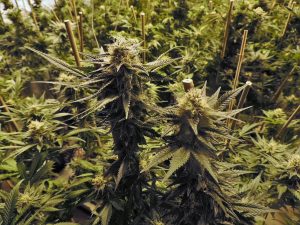 While legalizing marijuana has been discussed in previous legislative sessions, a legitimate proposal has yet to gain steam in Annapolis. Recreational marijuana will be legalized in Maryland within the next few years one way or another, but the state will move at its own pace. Based off the medical program that pace can be described as deliberate, or just plain slow. In order for legalization to actually have a legitimate shot of becoming law in 2020 the momentum has to start building soon, and it appears the ball has already started rolling. This past week a group of Maryland lawmakers conducted their first meetings as members of the marijuana legalization task force, which is a major sign that legalization has a legitimate shot of passing next year. This is not the first time a task force has been convened to address state marijuana policy, but this year it seems the sole focus is on legalization.
While legalizing marijuana has been discussed in previous legislative sessions, a legitimate proposal has yet to gain steam in Annapolis. Recreational marijuana will be legalized in Maryland within the next few years one way or another, but the state will move at its own pace. Based off the medical program that pace can be described as deliberate, or just plain slow. In order for legalization to actually have a legitimate shot of becoming law in 2020 the momentum has to start building soon, and it appears the ball has already started rolling. This past week a group of Maryland lawmakers conducted their first meetings as members of the marijuana legalization task force, which is a major sign that legalization has a legitimate shot of passing next year. This is not the first time a task force has been convened to address state marijuana policy, but this year it seems the sole focus is on legalization.
The bi-partisan task force is made up of state senators and delegates, and is expected to make formal recommendations by the end of the calendar year, which will be used to shape legislation when the 2020 session opens in January. Members will divide up into subcommittees that will focus on a variety of issues such as the impact on the criminal justice system, potential tax rates, licensing requirements and the impact on public health. Lawmakers will also seek the advice of outside experts with respect to issues such as the conflict between state legalization and federal laws that still consider marijuana to be a controlled substance.
This being a criminal law Blog, we’ll take a minute to comment on the criminal justice impacts that legalization could produce. The most obvious impact would be that criminal cases for possession of marijuana would likely cease to exist, with the exception being possession by minors and adults under the age of 21. Lawmakers would have to address whether possession by an underage person would be a civil infraction like with alcohol, or a criminal infraction. New regulations on the on the amount of pot a person could possess and where they could possess it would be imposed, but violation of these rules would likely be a civil infraction. Legalization would drastically reduce possession of marijuana with the intent to distribute cases, as the customer base would shrink to those who are unable to purchase at a dispensary, namely those under 21. Finally, charges for manufacturing marijuana (growing at home) would also be drastically reduced, as legalization would likely allow a limited number of plants to be cultivated within the confines of a lawful private residence.
One of the main motivations for legalizing marijuana is the massive potential for tax revenue that could be dedicated toward the state’s stagnant education systems. One expert went as far as stating that tax revenue from the legalization of marijuana and sports betting could generate over $3 billion annually for Maryland schools. During the first full year of the medical cannabis program state dispensaries reported sales of $109 million, and that figure could easily top $200 million in 2019. Sales this past May alone totaled close to $20 million statewide, a huge number considering the relatively limited amount of dispensaries and backlogs to obtain a license to purchase medical marijuana.
It’s nice that state lawmakers are taking legalization seriously enough to form a task force and meet six months before the legislative session begins. While the argument can be made that legalization in Maryland presents unique challenges that require months of careful debate, the reality is that 11 states have already legalized pot and ample information about their respective programs exists. While the Blog is cautiously optimistic that lawmakers will have all the information they need to construct a comprehensive legalization bill by January, we’ve certainly been let down before by our elected officials in Annapolis.
Benjamin Herbst is a Maryland criminal defense lawyer who handles all types of drug charges in state and federal court. He has experience representing clients in all jurisdictions throughout the state, and is available seven days a week for a free consultation at 410-207-2598. Benjamin also handles theft and robbery charges, as well as domestic assault, DUI and gun possession.
Resources
Maryland task force begins work on potential legalization of marijuana, baltimoresun.com.
 Criminal Defense Lawyer Blog
Criminal Defense Lawyer Blog

